Son of a Godhand
E3: Atsushi Inaba on Okami, and his latest and project.
One of the things you pick up on after a few E3s is the patterns of behaviour. The slowing of your feet on the second day; the growing numbers out on the concourse at any given time smoking and yalrighting to casual acquaintances; the secret handshake to walk to the front of the Nintendo queue; the tradition of lumping online journalists from different European territories into the same interviews.
The latter's fine under the right circumstances. For example, when you're only loosely marshalled by a PR. A lot of European journos are struggling along in their second language, so leaping in and taking advantage of gaps in conversation is a plausibly deniable act of interrogative aggression. It's your job, after all. And you can only take listening to so many questions when they're like, "The girl on the roof in the trailer - is she a playable character?" Is this what French games mags are like? "WORLD EXCLUSIVE: PLAY AS GIRL ON ROOF IN TRAILER".
To be fair, many of their questions are fine; they're just struggling to deliver them. But in a Japanese developer interview, it can really grate. Japanese developers are some of the most brilliant people working in the industry. Talking to them in their native language is something I dearly want to do. Because even the very best interpreters (and believe me, in games, they're few) automatically limit the number of questions you can ask in the time limit. And, to conclude the point, when Franscoph Jacobsmek and his bearded pal are trying to ask about the kind of texture processing algorithm through a three-language filtration process, it only exacerbates the problem.
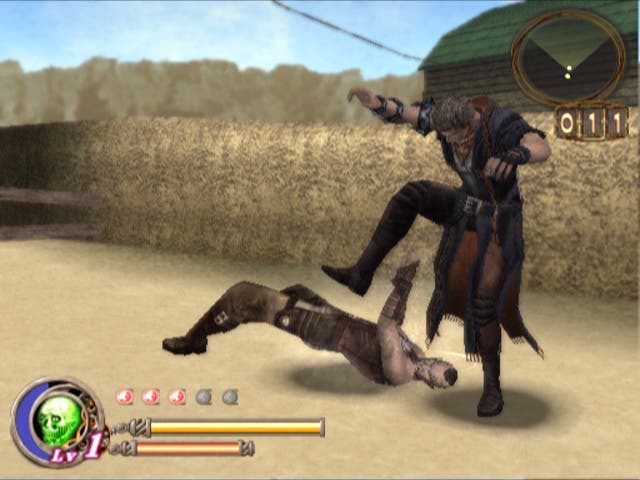
Anyway. Atsushi Inaba of Clover Studio has worked on both Okami, a tale of Japanese mythology starring a heavenly dog, out now on PS2 in Japan, and Godhand, a violent beat-'em-up with a comedic lilt. The latter I saw for the first time today. It allows you to rearrange attack sequences for single-button mashing and unlock new moves for the same - effectively asking you to read enemy reactions and then plan how to attack, rather than to have to learn how to attack as in your Gods of War and Ninjas Gaiden. You can also use godly special moves through a time-sensitive roulette function, and duck, counter and stomp by responding quickly to context-sensitive prompts. It doesn't look like much, but it's more than the generic screenshots suggest. Inaba worked on it, and today I got to interview him.
Accompanied by some other gentlemen of the press. Today's homework is to try and guess who asked what. Meanwhile I'll be writing a thank-you to the excellent interpreter, who somehow saved the whole thing.
I'm not really worried about the localisation as far as content is concerned because I think it's a very accessible game, but I am worried about how long the translation will take because it's a huge game...
[Grins] I think actually there are lots of Japanese who don't really understand the story, or aren't familiar with it. I think even if you don't get it you'll be able to enjoy the game. I'm not worried.
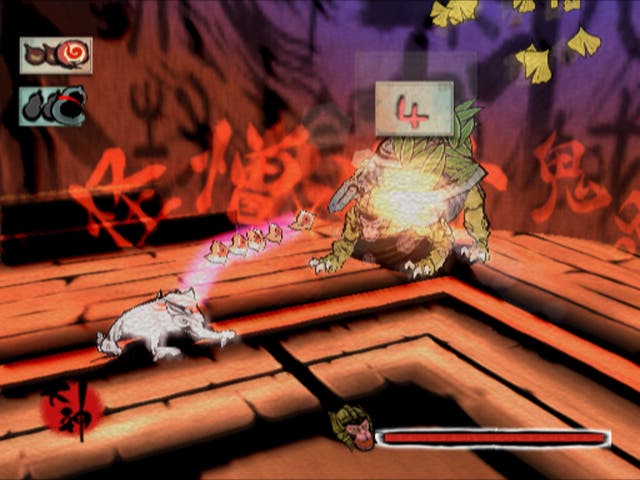
As far as things repeating in the game, that's something we've tried to cut down on to keep the pace up, but in this particular case we want you to read those messages about those items every time in case you've forgotten. That's intentional. And if it slows down the game, that's - to us - sometimes a good thing. You were going to add...
That particular element may have slowed you down a bit, but there are lots of gamers in Japan who really enjoy watching that sort of thing going "Aw he's so cute!" It's one of those things you can skip, but I guess not as fast as you'd like. And in general, Okami isn't a game that people are meant to play through just to finish it, but something you can play slowly and enjoy.
I think that games and art are very different, and that games are not art, and I'll explain why. Art, even though I might not fully understand it, seems something that is more nuanced, whereas games are something that you play, and they have an end condition; a goal. You play through them and experience them. And while I would like for the art of making games to improve and become more nuanced, I don't think something that you play will ever become as nuanced as true art.
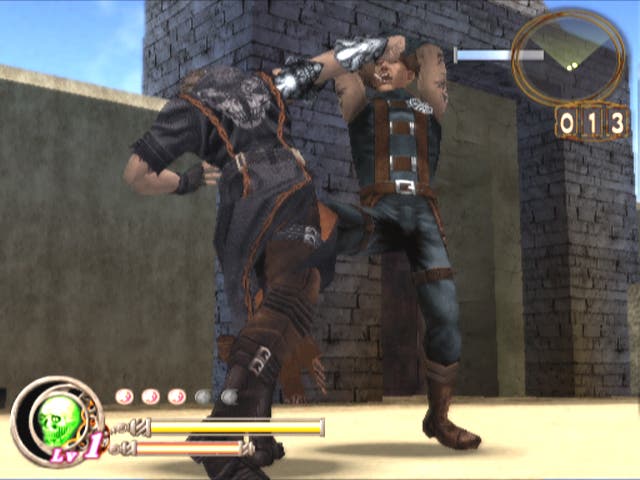
Game length is something that's very difficult to gauge. If you play an action game, for example, it shouldn't necessarily be about how long you play, but how long each encounter lasts, and how to pace that. In Okami's case, it's about being able to experience the world that we've created. We want you to be able to spend as long as you need and want to become acclimatised and obviously that takes more time. We didn't really approach game length in terms of one answer being better than the other. Short games are made to be short games. And that's good, yes, because people have less time nowadays. But in Okami's case we wanted people to enjoy the world, and felt comfortable making a longer game.
The best way to make a long game is... [he arcs his arm and moves his hand gently up and down] it's almost like a wave, where you're not overdoing the tempo. You build up to something, and once you get past it you give the player a rest and then start building up to something else. As long as you continue that while maintaining a tempo within a certain range, giving the user time to take a break and relax a bit, you can make a good, long game.
The genesis of the style comes from the fact that we weren't necessarily very particular in what we wanted. We began with the idea of enjoying punching, fighting with fists, and since we weren't very particular about the style - for instance, if it would have been manga based it might have felt too close to Viewtiful Joe - we went for something more realistic. But that didn't necessarily allow us to express what we wanted, so we're trying to trying to convey this idea through the way the characters fights as opposed to expressing it through a very particular graphical style.
The design of Godhand isn't necessarily like Okami where it's about ratcheting things. You have to play Godhand when you're putting all your energy into it. As you've seen you can design your own combos, and as you progress through the game, you'll acquire new moves and you'll put them into your combos as you discover certain approaches fail. As you play you can see the enemies' expressions and how they're reacting to what you're doing to them, and that's a good indicator of how to proceed in selecting your combos.
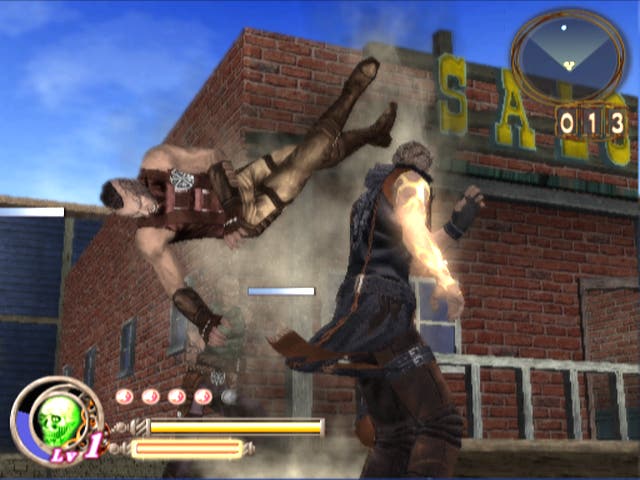
As far as it being something that will make games more interesting or unlock their potential, I'm not so sure, but in Godhand's case, Godhand was made from the start...
To be honest I'd never thought about it in that sense. I suppose that things like war games are very serious but they have be because they're about war, but the games that we make often have a bit of humour in them; that's just who we are. However, I would like to think that maybe if games were a little bit more amusing, more people would get involved in them. But I don't really know if that's the case - I wouldn't want to say without looking into it more deeply.
The Wii remote is something that's really interesting to me, and it gets me excited about the system and makes me want to try something on it. As far as the PS3 controller goes, we didn't really know about it; it was kind of a shock to us. So whether to say it's interesting, or I like it or don't like it, I really have to go back and rethink what I know about the PS3 before I comment on that kind of decision.
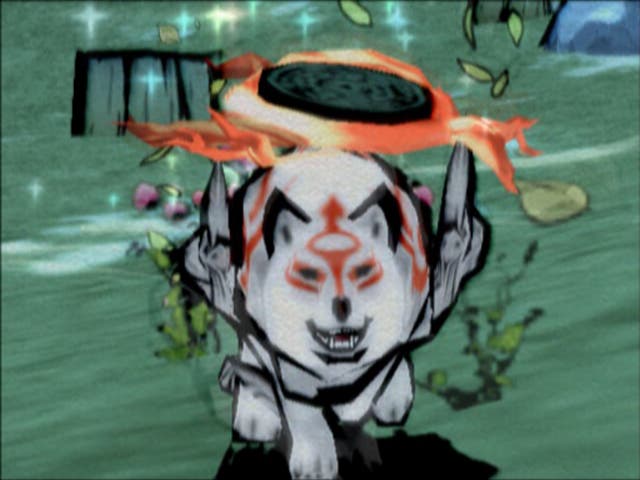
[Laughs] There's no real deep meaning to the cards. Getting the cherries of the strawberries [dropped by enemy characters] provides power-ups, and are kind of a throwback to older games, but the cards are just an in-joke for the team - they liked it, and that's why they put it in. And this Amaterasu, by the way, is a one of a kind. We'd really like to release something like this, but it's more difficult than it sounds. You can't have it.
With thanks to Mr Inaba, his able interpreter, and Capcom for giving us a drink. Also, with pre-emptive pardons to the European gentlemen who'll be thumping me tomorrow when I least expect it. Godhand is due out on PS2 this autumn.









